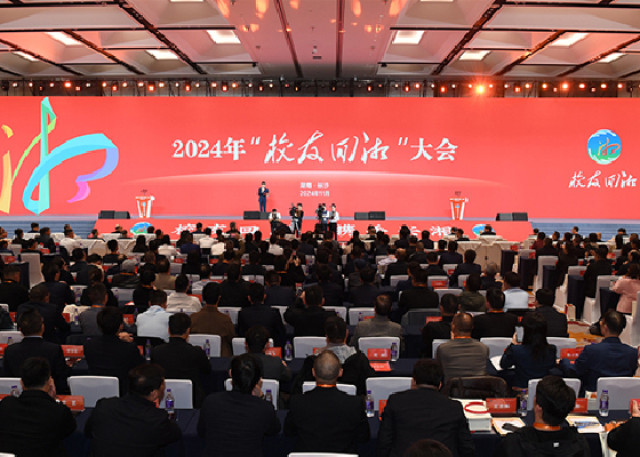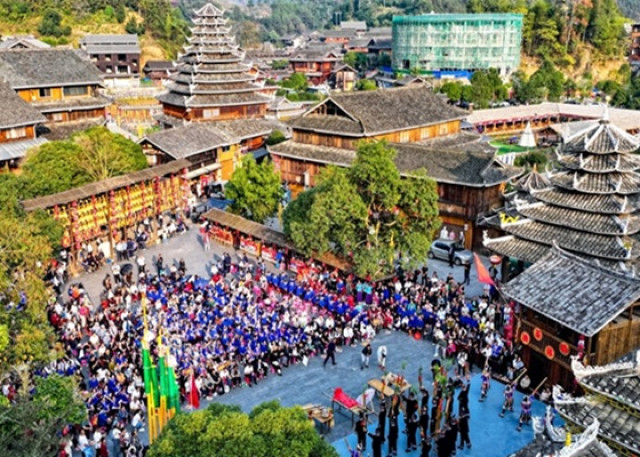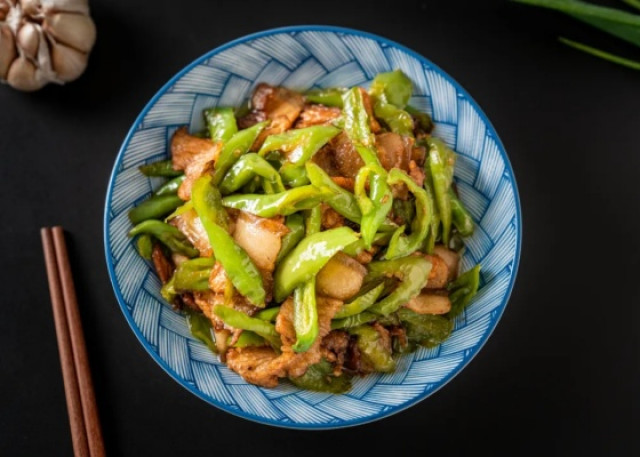這個(gè)“全國”運(yùn)動(dòng)會(huì)上,蕩秋千也是比賽項(xiàng)目,!

Swing as a sports competition may surprise many. At the National Traditional Games of Ethnic Minorities in Sanya, South China’s Hainan Province, over 60 athletes are competing for top honors in their respective categories.
很多人可能會(huì)驚訝,,蕩秋千竟然能作為一項(xiàng)競(jìng)賽運(yùn)動(dòng)。在中國南部海南三亞舉行的全國少數(shù)民族傳統(tǒng)體育運(yùn)動(dòng)會(huì)上,,60余名運(yùn)動(dòng)員在秋千大類各式項(xiàng)目中角逐最高榮譽(yù),。
Athletes aim to reach the highest swing or the most bell touches with minimal preliminary swings. Only female athletes are allowed to compete.
運(yùn)動(dòng)員的目標(biāo)是用盡可能少的預(yù)備動(dòng)作“蕩”到最高點(diǎn)或拿到最多的觸鈴次數(shù)。而這也是唯一一項(xiàng)僅女性運(yùn)動(dòng)員參加的項(xiàng)目,。
The competition is divided into two weight categories: 55 kg and below, as well as above 55 kg. The events are further categorized into height-based competitions and bell-touching contests, featuring both single and pair formats.
秋千項(xiàng)目共分為兩個(gè)體重組別:55公斤以下(含55公斤)和55公斤以上,。比賽項(xiàng)目分為高度比賽和觸鈴比賽,既有單人賽也有雙人賽,。
On the opening day of the competition on Saturday, Chongqing pair Wang Rong and Ma Qijin secured first place in the above 55kg category with 87 bell touches, after Hunan pair Fei Qianhong and Wu Anzhen won the 55kg category in 87 bell touches.
11月23日秋千項(xiàng)目開賽日,,重慶隊(duì)選手王榮/麻七斤在55公斤以上級(jí)雙人觸鈴比賽中,以觸鈴87次的成績斬獲該比賽一等獎(jiǎng),,湖南隊(duì)選手費(fèi)遷紅/吳安珍則在55公斤以下(含55公斤)級(jí)雙人觸鈴比賽中,,以觸鈴87次的成績獲得冠軍。
It is the Wang/Ma pair’s second consecutive win at the National Traditional Games of Ethnic Minorities.
這是“王麻”組合連續(xù)第二次在全國少數(shù)民族傳統(tǒng)體育運(yùn)動(dòng)會(huì)上奪冠。
“We hoped to achieve more but it’s not a perfect day due to the wind,” Wang told the Global Times, before noting the duo's composure played a significant role in their victory.
“我們本希望取得更多成績,,但由于風(fēng)向的原因,,今天完成得不是很完美?!?王榮告訴《環(huán)球時(shí)報(bào)》記者,,并表示兩人的沉著冷靜在比賽中發(fā)揮了重要作用。
“After years of competition experience our mindset was steadier, allowing us to perform at a higher level during the competition,” Wang said.
“因?yàn)閾碛卸嗄甑谋荣惤?jīng)驗(yàn),,我們的心態(tài)更加穩(wěn)定,,這讓我們?cè)诒荣愔心軌虬l(fā)揮得更加出色?!?王榮說,。
For the Hunan pair who secured first place, they underlined adaptability as the key to their success.
對(duì)于獲得冠軍的湖南隊(duì)組合來說,她們認(rèn)為自己成功的關(guān)鍵在于適應(yīng)能力,。
"Through different competitions, we've learned to adjust to varying conditions like the changes in wind,” Wu told the Global Times. “This adaptability has helped us progress further over time in swing competitions.”
“通過參加不同的比賽,,我們學(xué)會(huì)了適應(yīng)風(fēng)向等各種環(huán)境的變化,”吳安珍告訴《環(huán)球時(shí)報(bào)》記者,?!斑@種適應(yīng)能力幫助我們?cè)谇锴П荣愔腥〉酶蟮倪M(jìn)步?!?/span>
The swing competition in China typically is held in a rectangular area, measuring 20 by 8 meters, with a clearance of 15 meters above the ground.
中國的秋千比賽通常在長20米,、寬8米的長方形土地或草地上舉辦,場(chǎng)地上距地面15米高的空間內(nèi)不得有任何障礙物,。
The swing debuted as a demonstration sport at the second National Traditional Games of Ethnic Minorities in 1982 and subsequently became an official competitive event in the third edition in 1986.
1982年第二屆全國少數(shù)民族傳統(tǒng)體育運(yùn)動(dòng)會(huì),,秋千作為表演項(xiàng)目首次亮相;1986年第三屆全國少數(shù)民族傳統(tǒng)體育運(yùn)動(dòng)會(huì),,首次將秋千列為競(jìng)賽項(xiàng)目,。
The swing has long been a traditional activity in Northeast, Central, South, and Southwest China, rooted in a rich historical tradition. Notably, during the reign of Emperor Wu of the Han Dynasty (206BC-AD220), swings were a prominent pastime in the royal palace.
秋千,俗稱“蕩秋千”,,流行于我國東北,、中南、西南等地區(qū),,具有悠久的歷史,。值得一提的是,漢武帝時(shí)期,,蕩秋千在皇宮內(nèi)風(fēng)氣極盛,。
In 2006, the swing was recognized as part of the first batch of National Intangible Cultural Heritage representative items in China.
2006年,秋千被列入第一批國家級(jí)非物質(zhì)文化遺產(chǎn)代表性項(xiàng)目名錄,。
Compared to the conventional National Games, the National Traditional Games of Ethnic Minorities focus more on cultural celebration than competition, as awards for the lead finishers are listed as first, second and third prize rather than being given instead of gold, silver, and bronze medals.
與常規(guī)的全國運(yùn)動(dòng)會(huì)賽事相比,,全國少數(shù)民族傳統(tǒng)體育運(yùn)動(dòng)會(huì)更注重文化慶典而非競(jìng)技比賽,因?yàn)轭I(lǐng)先者獲得的獎(jiǎng)項(xiàng)是一,、二、三等獎(jiǎng),,而非金牌,、銀牌和銅牌。










